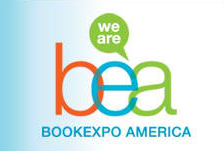 As I mentioned in my last post, despite my earlier intentions, I did spend a fair amount of time pitching book ideas at Book Expo America. In this post I’ll tell you a bit about what that was like, what strategies I used, and what I found most beneficial.
As I mentioned in my last post, despite my earlier intentions, I did spend a fair amount of time pitching book ideas at Book Expo America. In this post I’ll tell you a bit about what that was like, what strategies I used, and what I found most beneficial.
As I walked around the expo hall, I looked for publishers I knew, whose books were among those I love and read, or whose books compete with or complement books I want to write. In the latter two categories, I stopped at some booths where I was unfamiliar with the publisher. In all cases, this proved fun and fruitful.
I gained confidence after my very first stop: Gefen Publising, a Jewish publishing house located in Israel. There I got to speak with the publisher. I pitched several ideas, two of which he loved and asked me to send right away. These are partly written books (one has a proposal…very old) I thought I would have to self-publish. One of them I produced in short form as a booklet, but it was intended as a longer book. The other, a gift book, was once proposed to another publisher, accepted but never contracted.
I also stopped at New World Library, where I was so excited to meet Marc Allen, the publisher and founder, whose books I’ve read and who I’ve read about. We had a nice chat. However, when I asked him what type of book he wanted, he said, “Another Power of Now.”
“That’s a tall order to fill,” I responded, “Not that I wouldn’t like to fill it or be the next Eckhart Tolle.”
I also had the opportunity to speak to the publisher at Jewish Lights, who wasn’t exhibiting but was at the BEA and had stopped to speak to a friend of mine who was doing a book signing. He agreed to have me resubmit the first book proposal I ever wrote (which he looked at 10+ years ago). That was simply a unique opportunity that came out of being at the right place at the right time—and really pushing (pitching several times). I often tell the story of my encounter with him and how he called and told me he’d been waiting for that particular book “forever” but then did not contract it.
While I was waiting for that publisher to finish speaking to my friend, I spoke with two marketing reps at his publishing house, Inner Traditions, and they were quite taken by one of my ideas. This is the idea that I’ve wanted to write for quite a number of years and that my current agent agreed to represent me for; we put it on hold about two years ago. One rep wrote this idea down on a card so he wouldn’t forget it, and the other said, “I’d love to see that come across my desk when it’s finished.” I’ll be sure to tell my agent to submit there, especially since that’s a proposal I’m currently working revaming.
I stopped at two or three other publishing houses were I was able to pick the marketing reps’ brains about what type of business books they might like and to feel out their interest in some subject areas. This gave me ideas for books I could write—ones I hadn’t considered writing before. (One mentioned books they had contracted that fell through—opportunities for me to fill a need for them.)
Here’s my BEA takeaway: Although I did get a few acquisitions editor’s names, the invaluable part of going to BEA for me came through the interaction with the marketing reps. Why? They are the ones with the real power to buy books and to know what will sell. They are the ones who determine what books get contracted.
Here’s what happens when an agent pitches a book to a publishing house:
- The acquisitions editor reads the proposal and determines interest.
- If the editor is interested, the proposal will go on to the publisher or an editorial board meeting.
- If it gets past that stage, the marketing team will look at the proposal. They determine if they can sell the book. If they say no, the book is ditched. If they say yes, the author gets a contract. (The marketing team can also decide to change covers and titles down the line.)
By interacting with the marketing reps at BEA, I could gauge the marketability (the viability) of my book ideas. That’s not to say that speaking to a publisher wasn’t a valuable experience as well; it was, especially if from a small publishing house. But in a larger house, the marketing team will still have a ton of influence on a project. Speaking to acquisitions editors was valuable, too.
If you go to BEA, chat with those marketing reps. Ask them:
- what’s selling well
- what they like
- what they are looking for
- what they’d like to see come cross their desks
In particular:
- Listen to what they have to say about your ideas.
- Watch how they react to what you say.
That’s where you’ll get your answers about what publishing companies to pitch to—and what to pitch.
I surely did. I’ll be very busy in the next 2-4 weeks writing and polishing proposals and getting materials out to my agent and to publishers. You could be doing the same this time next year.
Barbara McDowell Whitt says
Nina, thank you for sharing some gems here. It is apparent that you got a lot out of Book Expo America.